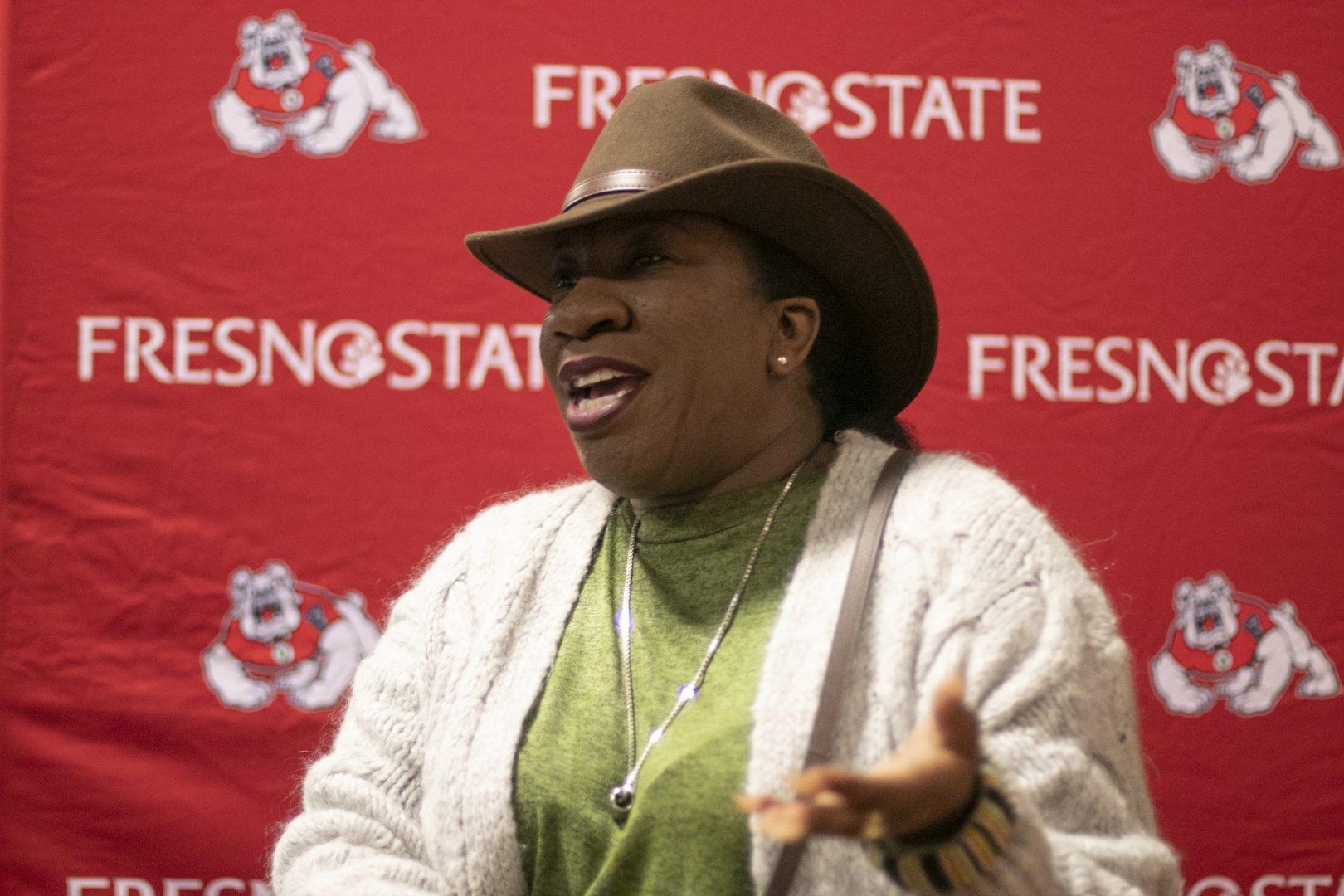Eleven years ago, she formally started a movement. Two years ago, it went viral.
But her pursuit of social justice and community healing began long before that.
Now, Me Too Movement founder Tarana Burke is spreading her message across the country, making a stop at Fresno State on Feb. 6.
At the event, “An Evening of Empowerment and Advocacy with Tarana Burke,” Burke spoke for more than an hour about her upbringing, her experiences and her mission of support and community healing to an audience of about 300 students, faculty and community members in the Satellite Student Union.
Burke said the importance of speaking to colleges and high schools was to shift the focus of accountability in communities and to help the next generation lead bolder, fuller lives.
“Every generation carries the work on forward,” Burke told The Collegian. “I think this generation will dramatically move the needle around sexual violence in ways that we haven’t seen prior to now, probably for at least a generation.”
The primary focus of her speech, Burke said, was to dispel misinterpretations about the movement by discussing its origin, backstory and future.
“I want people to walk away talking about the movement differently, understanding it differently,” Burke said. “And understand that it’s much broader than this finite way it’s defined in the media, and in that broadness that there’s a role for everybody.”
Growing up in Bronx, New York, Burke said she learned about black feminist literature through her mother at an early age. She said her family understood the importance of teaching Burke about what being a young black woman meant in America.
These teachings gave her the ability to recognized injustice in the world, but not the tools to fix it, Burke said.
Burke said she found a passion for social justice and community organization at a young age, when she organized a rally in protest of the way some individuals portrayed the five men accused in the Central Park jogger case in 1990.
Burke said one of her proudest moments was when a small article about the protest came out in a publication called “The New York Amsterdam News.”
“We mattered,” Burke said. “Our voices were heard. They put it in the paper, and it felt so empowering.”
She later joined the 21st Century Youth Leadership Movement, and moved to Selma, Alabama to work at the program’s camp with young individuals, teaching community leadership skills to adolescents.
The camp held safe space sessions, Burke said, where the campers and counselors could speak openly about anything. Burke recalled how these sessions often lead to campers disclosing their experiences of sexual violence.
Burke, however, said that she was never able to bring herself to share her own story of surviving sexual violence during these sessions.
It was at the camp that Burke encountered a girl whom she now refers to as “Heaven.” One day, Heaven approached her and disclosed the traumatic sexual violence she had endured. Burke said that Heaven’s story was so similar to her own experience, that she found herself unable to find the words to say, and directed her to a counselor at the camp.
“I saw the shock in her face. I saw the disappointment,” Burke said. “That guilt was enormous for a long time. And it was that guilt that made me make a decision that I would never be in that position again.”
She then began working with girls in seventh and eighth grade. Burke said when she began to learn that half of the girls she worked with had experienced sexual violence, she knew the issue was more prevalent than anyone was acknowledging.
What would become the “Me Too” movement began with a MySpace page and handmade workbooks mailed to individuals across the country looking to bring sexual violence support to young girls in their communities, Burke said.
Burke said it was shortly after that she began to realize that it wasn’t just kids and teens that needed this type of support, and that adults needed this message of solidarity just as much.
After years of advocacy and helping thousands of sexual assault survivors, the movement came into the national spotlight. Hollywood celebrities began sharing their stories of surviving sexual violence using “#MeToo” in 2017.
“Social media is a great tool. But a hashtag is not a movement,” Burke said. “Part of movement building is that it can’t solely live online. You have to get in the community and look people in their eyes and tell them, ‘We need you,’”
The movement has gained national attention as survivors have come forward to speak out about their experiences, implicating several high-profile individuals.
However, Burke emphasized that the movement is in no way anti-male, but it is about bringing together survivors of sexual assault and harassment to give them the support and confidence to speak out about their stories.
“Movement is not built on social media. It’s built by people,” Burke told the crowd. “If you’re ready to do that work, then me too.”
The event was free to Fresno State students and faculty and was presented by Fresno State Student Involvement, in partnership with USU Productions, the President’s Commission on Human Relations and Equity, ASI, Fraternity and Sorority Life, Title IX and Clery Compliance, Cross Cultural and Gender Center, Student Health and Counseling Center, Women’s Studies Program and Student Housing.





